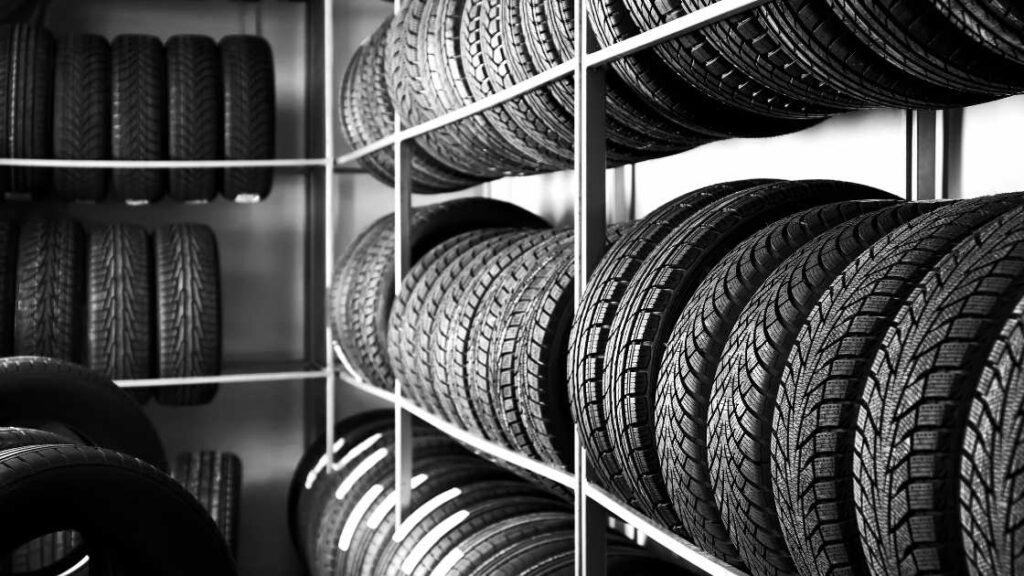Opening a tire shop can cost between $10,000 to over $300,000. Initial expenses vary widely depending on location, size, and services offered.
Opening a tire shop involves a substantial financial commitment and meticulous planning. Entrepreneurs keen on venturing into this business need to carefully assess the costs associated with leasing or buying property, obtaining necessary equipment, and stocking inventory.
A critical aspect of this endeavor is securing a prime location, ensuring high visibility, and convenient accessibility for potential customers. Therefore, when contemplating the question, “How Much Does It Cost to Open a Tire Shop?”

Beyond location, securing top-notch tire changing and balancing machines is essential, as this will be the backbone of your services. Stocking a wide range of tires to cater to different customer needs is also important, which means building relationships with suppliers to ensure competitive pricing and a steady supply.
Keeping in mind that safety standards and environmental regulations are stringent in this industry, you’ll need to reserve funds for compliance. Lastly, marketing efforts shouldn’t be overlooked to promote your new tire shop and establish a strong market presence from the outset.
The Tire Shop Business Landscape
Venturing into the tire shop business can be a lucrative journey. Before the ignition turns, the costs involved are key. The tire shop business landscape paints a vivid picture of investment necessities and market functioning.
Market Trends And Growth Potential
The auto industry’s evolution drives tire market trends. Eco-friendly tires gain traction as sustainability becomes vital. Demand for high-performance tires soars with an increase in vehicle sales. Here’s what’s shaping the tire shop industry:
- Electric vehicles (EVs) impact: Tire shops prepare for EV-specific needs.
- Smart tires: Technology integration presents new opportunities.
- Aftermarket sales: Replacement tires Improve the industry.
Growth potential is significant, with forecasts suggesting a steady climb. Tire businesses can look forward to benefiting from:
- Increasing global vehicle ownership.
- The essential nature of tire maintenance and replacement.
- Expansion into online sales and services.
Target Demographics For Tire Shops
Pinpointing the right audience is pivotal for tire shop success. Core customers include:
| Demographic | Characteristics |
|---|---|
| Vehicle Owners | Seek quality and long-lasting tires. |
| Commercial Fleets | Require reliable bulk tire solutions. |
| Auto Enthusiasts | Look for performance and specialty tires. |
In addition, focusing on regional traffic patterns and vehicle types enriches target market analysis. Tire shops must adapt to local demand and provide relevant products and services.
Initial Investments For Tire Shop Entrepreneurs

Starting a tire shop takes more than just a love for cars. Like any business, it begins with a clear of the costs involved. Aspiring entrepreneurs must consider many initial investments before opening their doors to customers. Let’s break down these costs into easier parts. This will help anyone looking to start a tire shop.
Location And Leasing Costs
Finding the right place is the first big step. The location of a tire shop is key for attracting customers. Good visibility and access can mean more sales. The monthly rent often depends on the size and spot of the property.
- Rent for a small shop might start at $1,500 monthly.
- Larger shops in prime areas could cost $5,000 or more each month.
Remember to budget for security deposits and the first month’s rent upfront. You will also need money for permits and insurance. These are must-haves for a legal, safe business.
Essential Equipment And Inventory Expenses
Next, fill that shop with the right tools and tires. Quality equipment ensures quick, reliable service. Here’s a brief look at what you’ll need:
| Equipment/Inventory | Cost Estimate |
|---|---|
| Tire changers | $4,000 – $10,000 |
| Wheel balancers | $2,000 – $7,000 |
| Alignment system | $10,000 – $30,000 |
| Inventory (tires, valves, weights) | $5,000 – $20,000 |
Don’t forget the little things like tools, jacks, and air compressors. Such items might add another $1,000 to $3,000. To start, aim for a varied tire stock to meet different customer needs.
Every tire shop also needs a safe, organized workspace. Costs for storage solutions and office equipment can add up. Expect to spend $2,000 to $5,000 in this area.
Navigating Licenses, Permits, And Insurance
Ready to roll into the tire business? There’s more to starting your tire shop than just buying equipment and finding a location. You need to weave through a maze of legal formalities. Let’s Investigate the essentials like licenses, permits, and insurance that help put your tire shop on the smooth road to success.
Regulatory Requirements For Tire Shops
Setting up a tire shop means complying with many regulations. These may differ based on your location. Make sure to check with local authorities on these basics:
- Business License: The primary permit to legally operate.
- Zoning Permit: Confirms your shop is in a suitable area.
- Environmental Permits: Needed due to tire disposal issues.
- Building Permits: Required if you plan construction or alterations.
- Fire Department Permit: Ensures fire safety standards are met.
- Sign Permit: Required if you’ll be displaying signage.
- Special State Permits: Additional permits might be necessary depending on state-specific regulations.
Pro Tip: Start the permit process early to avoid delays in your shop opening.
Insurance Policies And Protection

Protecting your business with the right insurance is vital. It guards against unexpected events. Here are key policies for a tire shop:
| Insurance Type | Purpose |
|---|---|
| General Liability Insurance: | Covers legal hassles due to accidents, injuries, or claims of negligence. |
| Property Insurance: | Protects your property from damage due to fire, theft, or natural disasters. |
| Worker’s Compensation: | Provides coverage if an employee gets injured on the job. |
| Product Liability Insurance: | Useful if a product you sold or installed fails. |
| Business Interruption Insurance: | Helps recover lost income during unexpected closures. |
Essential Step: Talk to an insurance agent who understands the unique risks of tire shops.
Operational Costs To Consider
Starting a tire shop involves a range of ongoing expenses. These operational costs are vital for the smooth running of your business. Let’s break down some of the major recurring expenses that you need to prepare for.
Staffing And Training Expenses
Employees are the backbone of your tire shop. You need skilled technicians to provide quality services. Initial and ongoing training is paramount for maintaining high standards.
- Salaries: Fair wages are essential to retain skilled labor.
- Benefits: Health insurance and other benefits can attract top talent.
- Training Programs: Regular upskilling is a must in this ever-evolving industry.
Remember, happy employees lead to happy customers.
Utilities And Maintenance Overhead
Running a tire shop requires electricity, water, and other utilities. Maintenance keeps your equipment in top shape. Here’s an overview:
| Utility/Maintenance | Estimated Monthly Cost |
|---|---|
| Electricity | $200 – $800 |
| Water | $50 – $200 |
| Maintenance | $100 – $500 |
| Internet/Phone | $100 – $300 |
Timely maintenance can prevent costly repairs in the future. Keep a close eye on these regular expenses to manage your budget wisely.
Marketing And Customer Acquisition

Entering the tire business involves more than just setup costs. Marketing and customer acquisition are key to your shop’s success. These efforts help build your brand, draw customers, and foster loyalty. To thrive, you’ll need a calculated approach in these areas.
Branding And Advertising Budgets
Creating a strong brand identity is vital. It makes your tire shop memorable. Your branding includes logos, slogans, and your shop’s unique story. These are often a client’s first impression. A professional look can set you apart. Ensure part of your budget goes to these essentials.
- Logo Design: A catchy logo can cost between $250 to $2,500.
- Website Development: Expect $500 to $5,000 for a user-friendly site.
- Social Media: Running ads can start from $200 to $1,500 monthly.
Your advertising budget should reflect your business goals. Keep track of funds. This ensures you invest smartly in many platforms like online ads, local newspapers, and flyers.
Promotions And Customer Loyalty Programs
Promos entice first-time buyers. Loyalty programs keep customers coming back. Budget for these smartly. They increase sales and Improve customer relationships.
| Promotion Type | Cost Estimate |
|---|---|
| Discount Coupons | $100 to $500 |
| Referral Discounts | $50 to $200 per referral |
| Loyalty Cards | $1 to $5 per card |
Remember, loyalty programs should not be expensive. They offer long-term business growth. Keep your offers simple. Make sure they add value to customer experiences.
Long-term Financial Planning

Opening a tire shop comes with its challenges and rewards. To ensure your business thrives long-term, one must grasp the art of financial planning. It’s not just about knowing current costs but also preparing for the future. This involves careful calculations and strategic growth measures.
Calculating Break-even Points
When your tire shop will start making a profit is key. The break-even point is the moment your revenue equals your expenses. To calculate this:
- List all initial investment costs (shop rental, equipment, inventory).
- Estimate monthly operational costs (utilities, payroll, marketing).
- Add fixed and variable costs for total monthly expenses.
- Calculate average sales income per month.
Divide total expenses by the average sale price of your service to find how many sales you need to break even.
Strategies For Scaling And Growth
Growth doesn’t just happen—it’s planned. To scale your tire shop:
- Invest in quality tire inventory and offer diverse services.
- Use a loyalty program to encourage repeat business.
- Adopt new technologies for efficient service and communication.
- Collaborate with other businesses for cross-promotion opportunities.
Revisit your business plan regularly to adjust strategies for changing market conditions.
Frequently Asked Questions Of How Much Does It Cost To Open A Tire Shop
Is Owning A Tire Shop Profitable?
Owning a tire shop can be profitable, with consistent demand for tire replacements and services. Effective management and strategic location are key to maximizing earnings.
Can You Make Money Selling Tires?
Yes, selling tires can be profitable. Retail or online tire sales offer income potential, especially if you offer competitive pricing and quality service. Catering to a niche market, like performance or off-road tires, can also Improve earnings.
How Do You Value A Tire Business?
To value a tire business, examine financial records, assess market position, calculate asset worth, and consider future earnings potential. Analyze industry trends and compare with similar businesses for an accurate valuation.
How Do I Get More Business At A Tire Shop?
To Improve business at a tire shop, offer promotions, maintain an active social media presence, provide excellent customer service, engage in local community events, and solicit customer reviews to build a strong reputation.
Conclusion
Opening a tire shop can be a lucrative venture with proper planning. Initial costs vary widely, from $10,000 to over $100,000, depending on location, services, and scale. Essential investments include space rental, equipment, and inventory. Remember, thorough market research preps you for success.
Before diving in, ensure you have a detailed budget to guide your launch.



7 thoughts on “The Ultimate Guide: How Much Does It Cost to Open a Tire Shop?”
Pingback: How Much Does It Cost To Replace Ball Joints | Optimizing Your Ride: Unveiling The $1,000 Secret To Ball Joint Replacement Success!
Pingback: How Much Does It Cost To Open A Planet Fitness? Expert Tips
Pingback: How Much Does It Cost To Travel Europe? Expert Tips
Pingback: How Much Suabru Cost To Install Hitch? Proper Guideline
Pingback: How Much Does It Cost To Fix A Flat Tire?
Pingback: How Much Does It Cost To Repair A Windscreen?
Pingback: How Much It Cost To Replace Air Conditioning Blowing Hose?